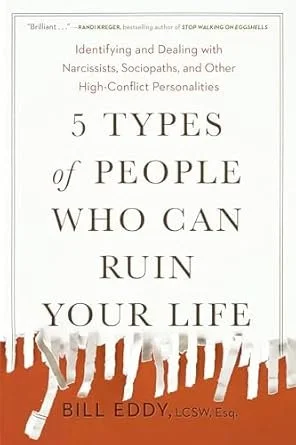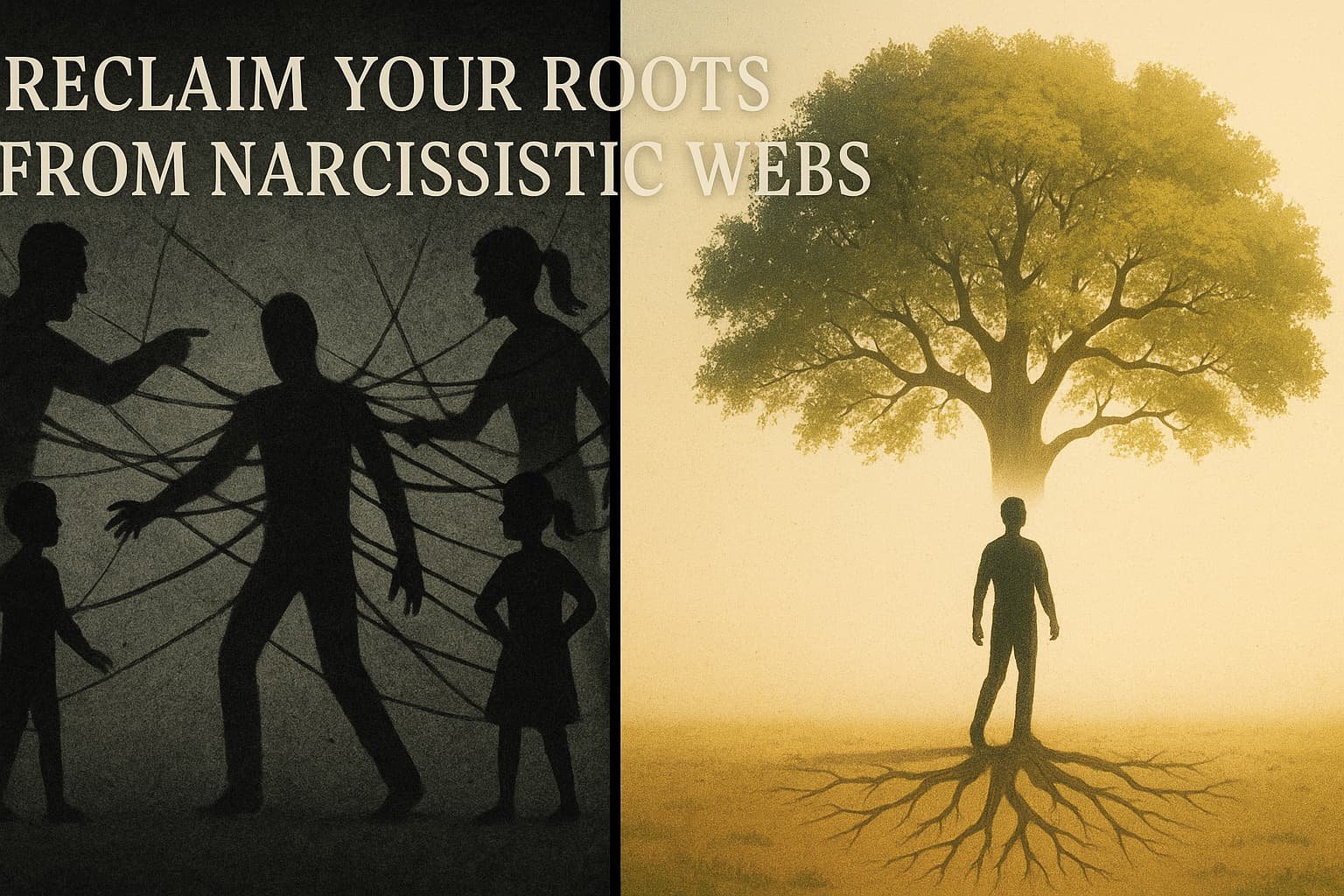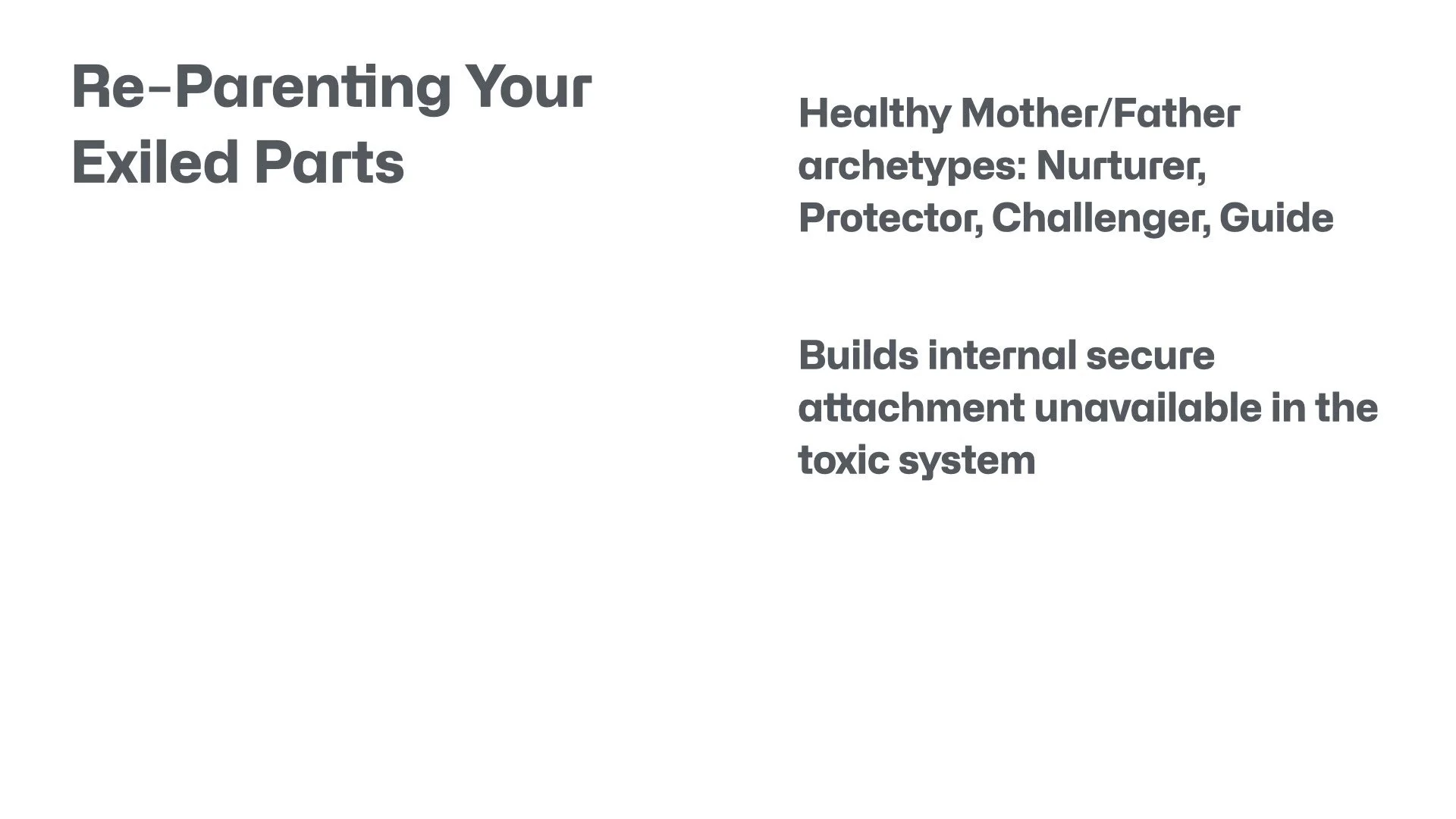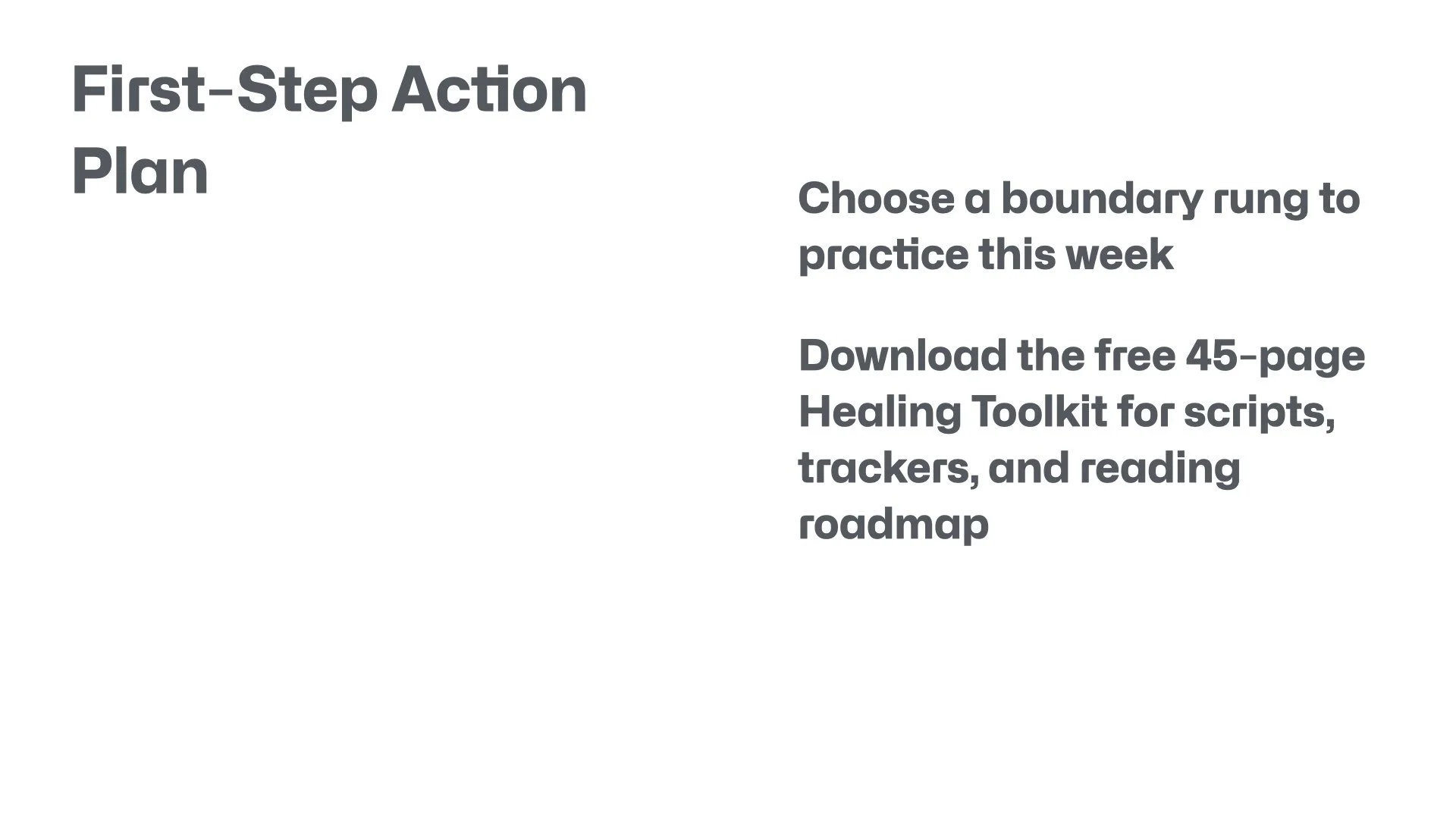Breaking Free from the Narcissistic Cycle: Recognizing the Signs
Introduction
Hi everyone, this is Blake Anderson and I'm a registered social worker and therapist here in Toronto, Ontario. In this blog post, which supplements my YouTube video, I want to cover five signs you're still stuck in a narcissistic cycle, and how to break free from this. Drawing from my professional experience, I'll share some of my experience with my clients and observations and signs that I notice when I see them more engaged or reacting as part of being on the receiving end of narcissistic abuse or a difficult personality in their life. If you're dealing with narcissistic abuse recovery in dysfunctional family dynamics—often as the scapegoat—this post offers practical strategies grounded in self-regulation and radical acceptance.
Recognizing the Signs
One of the main indicators that you're part of a narcissistic cycle is the constant internal rumination and heightened anxiety. Often these individuals are living in their head ruminating and constantly mind reading thinking about what perhaps a narcissist is thinking, and have this notion of anticipatory anxiety. So they're anxiously anticipating, having participatory anxiety, often worried about what the narcissistic individual's gonna think or getting more in their mind. This type of 'crazy making' is especially common around high-conflict personalities, as discussed in the book The 5 Types of People Who Can Ruin Your Life by Bill Eddy. I've seen domestic situations where, because I worked in child welfare and within various custody and access situations or where there's usually obviously children involved and there could be the allegation of parental alienation or estrangement from the parent not seeing the kids. In these extreme situations, the person on the receiving end of this dynamic—it could be considered perhaps more codependent—they typically sometimes are showing more the signs of anxiety or depression because they're reacting. But usually when these individuals can calm and get some space and regulate themselves, a lot of these symptoms will typically go away. But it's kind of compounded or complex because perhaps these individuals do have anxiety or depression. So it's not to say it's always due to being on the receiving end of narcissism, but I would say that typically individuals are ruminating and they're obsessing kind of about what the narcissist is gonna think or say and kind of anticipating and thinking around the next step.
Another sign is that these clients are overly internalizing. In Lindsay Gibson's book, Adult Children of Emotionally Immature Parents, she has a notion of there's internalizers. So these are individuals that when it's unhealthily expressed, they're over owning the blame of the dynamic and the situation. They're seeking endlessly to self fix. And so they're typically reading books, studying the subject, and doing their own therapy; they're overly taking ownership of the situation when in reality, if the other person who could be considered an externalizer, typically they're projecting their faults onto the internalizer and they're resisting reflection. So in an ideal world, the externalizer's going to develop more internalizer skills and the internalizer can develop more externalizing skills. In terms of the internalizer, because they can self-reflect, typically they're the ones that are able to grow because they have that capacity. So it's also just recognizing the external reality and taking on more of a neutral and not personalizing it so much and getting entangled in perhaps proving your case or trying to keep the narcissist accountable—these are all ways in which it entrenches you in the cycle. And so again, the internalizer's really the only one that can fundamentally change. Perhaps the person who's more externalizer-like—it exists on a spectrum too, right? So there could be a level that the externalizer's able to have some level of insight or self-reflection as well.
A further sign I see is that they get into rumination. This also goes into being overly in their mind, replaying late night fights or perfect rebuttals that they could have said. There's also the notion of intermittent reinforcement—it keeps the hope glued. So this is a concept of the narcissist with intimacy, like having intimacy sometimes but then going cold and stonewalling. It's always infrequent and never predictable. In a healthy relationship, there would be co-regulation, transparency about these matters, and consistency over time, showing of care. But in a narcissistic dynamic, the narcissist will use a way to keep us on our toes and dysregulating ourselves; over time, that starts to erode our self-esteem or confidence. And so that's why these individuals, it's kind of an addictive quality at times—could be considered a toxic bond because of this intermittent reinforcement. So just recognizing that, and again, that takes time to get back to yourself and regulate yourself so you can counter this unhealthy intermittent reinforcement that you could be on the receiving end of. A good reminder in this is to keep a log of the top 10 reasons why I left, and maybe talk to a friend, getting some accountability. The more that you can articulate to yourself and keeping records of some of the bad times, it allows you to not have that false hope and to allow that future faking that can occur with the narcissist—giving you kind of this false notion that they're gonna change and giving you a sense that they are, but then never do. It keeps you from going back to the toxic cycle or to the well that is not good for you.
Another sign that I see in my clients who have been in this dynamic is that they have a lot of anxiety in their body. They look like they've been walking on eggshells; they have racing heart. They often report shallow breath, gut tension. They tend to be hypervigilant, likely due to the trauma driving survival.
Strategies for Breaking Free
To break free from this cycle, it's crucial to focus on self-regulation. This means connecting with your body, embracing mindfulness practices such as deep breathing, yoga, or any physical activity that grounds you. Ensuring a healthy lifestyle with proper sleep, nutrition, and exercise can also alleviate the mental toll of narcissistic abuse. By connecting with the body, the breath, and focusing more on your own personal life and your own hobbies and activities, you're gonna do better just in terms of 'cause ultimately you can just, all you can do is regulate yourself. And when you're coming from a calmer place, you're gonna be more rational and coming from a place where you're not aggravating the situation further. Obviously it takes two to tango to some degree. It's not to blame you necessarily; it's just to recognize that your reaction to the system anxiety or the dysfunctional person is also contributing to feeding the cycle. Usually in these situations, the narcissistic individual wants this narcissistic supply—this energy or this validation; they want your negative reaction. As long as they're getting some form of response, it's feeding their ego.
A good step to help with this is breathing deep, diaphragm breathing, and doing this for at least 60 seconds, connecting with your body. Again, it could be yoga or some form of physical practice. Ensuring you're getting sleep, drinking water, and your diet is healthy—this is all gonna help you counter the tendency to stay within the enmeshment of the dysfunction.
Setting boundaries is essential. I often recommend using the 'boundary ladder' approach, which involves making gradual, assertive requests and knowing when to enforce limits. Remember, boundaries are for your protection, not contingent on the narcissist's acknowledgment. I do often recommend the boundary ladder, so it's beginning just soft asking, clear request, stating limits, and then enforcing limits. Usually you ask politely, and if that doesn't get acknowledged, then you have a clear request, and or you state your limits and then you enforce your limits. And you might have to say a hard no to certain situations, but often, you know, boundaries are more to do with us, right? And we sometimes, well, we often don't need narcissists' approval or even their acknowledgement. You just act. And sometimes that keeps you locked in because you want them kind of to acknowledge it, but then that keeps you entrenched still, right? So better is to have actions speak louder than words. And you have to ask yourself, do they have the capacity to even kind of acknowledge any sort of boundary, which is typically the case if someone's really unhealthy. As Sam Vaknin says, these people have maybe some psychotic elements in the sense that they don't have a sense of boundaries with themselves and the external world, so their reality testing is off and they basically consume people, right? In some sense, they introduce death to anybody around them because your independence or differentiation can't be tolerated—that's a front to their false self. They basically convert everyone to introjects and so to basically enter parts themselves, and if you don't go along with that part or that introject or that snapshot, there's hell to pay or you're going to have consequences.
Another effective technique is the JADE approach: refrain from Justifying, Arguing, Defending, or Explaining yourself. This helps in maintaining your intrinsic worth without falling prey to the narcissist's manipulation. Another tool or strategy out there is the JADE technique—it's just reminding yourself not to justify yourself, not to argue, not to defend, and not to explain. 'Cause that comes from a place of intrinsically who you are and know that you're a good person, and you're not being gaslit and self-doubting, and having insecurities. I guess the question is who's driving the bus? This is because, if we're coming from an insecure part of ourselves or have a lot of shame and guilt, then that's going to prevent us from not wanting to justify ourselves or argue or defend. But that's just a good reminder when we find ourselves—and I think all the best of us, right? Get caught up sometimes defending or arguing or just justifying ourselves. But the idea is if we practice the JADE technique, then it's just a signal to us that we are getting ahead of ourselves, and that it's not gonna be fruitful in our discussions with these individuals. You could just practice saying one no per day to build this muscle of boundary setting.
Embracing Radical Acceptance
In my practice, I emphasize the importance of radical acceptance. This involves acknowledging the clinical limitations of narcissistic personalities and understanding that they may never change, despite your efforts. Observing their behavior over time can provide insights into their unwillingness to reflect and adapt. Observing yourself within that cycle and how at the first you might really be have a sense of righteous anger and righteous rage as they call it. And then you can go from a place of maybe swinging a lot in terms of being love-bombed maybe by the family and or having perhaps some skepticism yourself—perhaps they're not as bad, or maybe I'm at fault. But I think it's just observing that and recognizing, again, remind yourself some of the instances that did occur and radically accepting—so not minimizing or pushing away the reality I think is very important. I think it's also good to not always trust your mind necessarily when you're at the receiving end of being, or when you've just been exposed to a conflict that's very severe and that's really triggered your toxic shame or your attachment wound, maybe particularly if it's with your parents. Then just understanding that it's gonna take some time and space to heal, and in the immediate week or so, if not month, it's better to probably have a level of skepticism to some of your thoughts, your feelings, just knowing that you're probably gonna be swinging a bit from the good and from the bad. It's the same with if you're going through a breakup; you have to give yourself time to grieve. There's a notion of disenfranchised grief—you have to sometimes grieve individuals before they've passed, in the sense of that relationship you had with them and what you thought the relationship was.
The general distinction here is between radical acceptance and resignation. You want to radically accept the fact that there are really clinical limits to a narcissistic personality and, and again, the notion is if you just explain it right, then they'll get it. I think we often find ourselves in that loop, especially if we're sensitive individuals or value self-development or have curiosity about why people do what they do. We're going to think, okay, well if I just say it this way... Lindsay Gibson's where she'd probably be more encouraging to communication. But if someone's truly narcissistic according to Sam Vaknin, it's like he says, get away, stay away from these individuals; there's nothing good that will come of it. And so you have to really pick your poison, as they say. That comes to knowing who you're dealing with, and that's through observations through time. And typically in these situations, again, you don't necessarily have a diagnosis of NPD or a psychiatrist or even a psychologist observing these individuals. So because typically they aren't ones to go to therapy, or just if they do, they don't tend to acknowledge always their personality. Right, because that's the heart of the disorder.
Creating emotional distance is another vital step. Whether it's taking a brief hiatus or marking a full thirty days away from the toxic environment, this time allows you to rebuild your sense of self and navigate away from the trauma fog. And again, a reminder here is to reparenting your exiled parts, so engaging yourself from having a healthy mother and healthy father within yourself. And that can go back to having a secure attachment within yourself. If you don't have parents that are able to do that or willingness to do that, then ultimately it comes down to you. You can rely perhaps sometimes we externalize or we look outside ourselves onto, it could be perhaps in-laws or other mentors or people in our lives at our work or in our personal life. And we might unconsciously, or even consciously, look for those individuals to provide what was missing in our childhood. But we can also do that within our own inner resources. It's also good if we're consciously aware that we're maybe seeking out that need we might've been missing—I think that's important.
For structured support in scapegoat recovery and crafting a personal manifesto to align your life with purpose, explore my bundled course offering healing tools and vision-building. Learn More.
Conclusion
Reparenting your internal parts and nurturing a secure attachment within yourself can redefine your journey towards healing. Seek resources that support this, and remain vigilant about relying on your inner strengths. If you're looking for more structured guidance, consider downloading my 45-page healing toolkit, which includes worksheets and strategies discussed here to assist you further on your path to recovery. You could consider downloading my 45-page healing toolkit where I offer you some worksheets of what I've covered today—it can be very helpful if you really practice those tools and strategies that are in that work booklet. Yeah, just move you along further on your journey and keep you less trapped in this cycle.
Thank you for taking the time to read this blog post. If you have personal experiences or feedback you'd like to share, please feel free to comment—your stories and insights can be a powerful part of this community's healing journey. Stay well and take care. If you did like this content, please like, subscribe to my YouTube channel, or comment below if you have any experience of your own or any feedback you wanna share. And so thanks for reading and have a great day.













